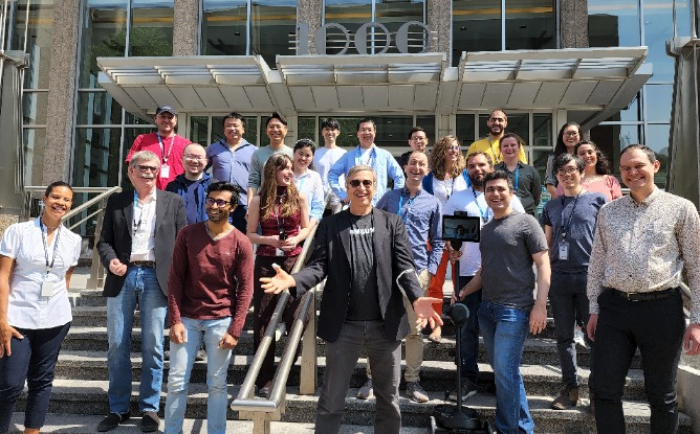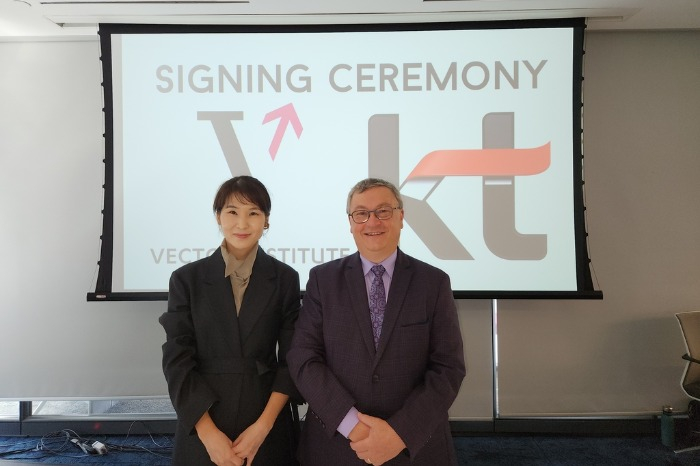Artificial intelligence
S.Korean conglomerates increase AI R&D hubs overseas
Tech giants and automakers target US, Canada and other countries that are nurturing advanced technologies and AI experts
By Sep 29, 2022 (Gmt+09:00)
3
Min read
Most Read
LG Chem to sell water filter business to Glenwood PE for $692 million


Kyobo Life poised to buy Japan’s SBI Group-owned savings bank


KT&G eyes overseas M&A after rejecting activist fund's offer


StockX in merger talks with Naver’s online reseller Kream


Mirae Asset to be named Korea Post’s core real estate fund operator



South Korean conglomerates are increasingly looking overseas as bases of their artificial intelligence research centers to build strong networks with academia and industries there to attract international talent and strengthen their research capabilities.
Hyundai Motor Group is investing $424 million to establish an AI research center in Cambridge, Massachusetts to be headed up by Mark Raiber, the founder and chairman of US robotics company Boston Dynamics Inc.
The R&D center, tentatively called the Boston Dynamics AI institute, will promote cooperation between it and prestigious universities such as MIT and Harvard University to develop technologies for intelligent robots’ movements, recognition and interaction. The center aims to build a profit model via sales of AI robotics platforms in the mid to long term.
LG Corp.’s AI research institute set up its first overseas base in Michigan, the LG AI Research Center, in March.
The Ann Arbor-based R&D center is promoting partnerships with academic institutes and companies around the region, such as the University of Michigan, General Motors Co. and Ford Motor Co.
Samsung Group operates six AI R&D centers worldwide, in Silicon Valley, New York, Cambridge in the UK, Toronto, Montréal and Moscow.
In June, Samsung AI Center Montréal moved to another location downtown, doubling the size of the original lab with 15 new research scientists to apply advanced AI to telecommunications, machine learning, robotics and other multi-modal interactions. The center is headed by McGill University Professor and AI tech expert Gregory Dudek.
SK Group operates Gauss Labs Inc., a Silicon Valley-based AI R&D established in 2020. The center is focused on industrial AI solutions, aiming to solve the challenges of the semiconductor manufacturing process.

The Korean conglomerates are also recruiting professionals via overseas research centers, targeting countries that have vaster pools of AI talent than Korea.
One such example is Canada, which launched the government-backed Pan-Canadian AI Strategy in 2017 to build a robust talent pipeline and ecosystem in the AI industry.
There are about 600 new AI doctoral researchers in Toronto alone per year, Other AI expert hubs in Canada include the University of Waterloo and Université de Montréal. This compares with Korea, which has fewer than 100 new graduates from eight graduate schools for AI studies per year.
Some Korean tech giants, which don’t have AI research centers outside the country, are increasing their efforts for academia-industry cooperation and talent recruitment via overseas universities and institutes.
Korea’s top mobile carrier SK Telecom Co., online portal giant Naver Corp. and AI tech developer Kakao Enterprise Corp. are working with University of Toronto in advanced AI technology development.
KT Corp., a major Korean telecommunications company, signed a partnership agreement with Canada’s AI research center Vector Institute on Sept. 22 for joint R&D. Five months ago, the telecom company showcased AI-powered assistants and a disinfection robot at the World IT Show 2022 in Seoul.
The overseas countries are widening the gaps between them and Korea in terms of investment and the number of professionals in the AI sector, a tech industry source said. About 20% of those who earn PhDs in AI from Korean universities in AI move overseas for higher salaries and better employee benefits, the source added.
Write to Han-Gyeol Seon at always@hankyung.com
Jihyun Kim edited this article.
More to Read
-
 AutomobilesHyundai to set up AI robotics R&D center near Boston
AutomobilesHyundai to set up AI robotics R&D center near BostonAug 12, 2022 (Gmt+09:00)
1 Min read -
 Artificial intelligenceNaver to enter smart building market with 5G, AI robots
Artificial intelligenceNaver to enter smart building market with 5G, AI robotsJun 08, 2022 (Gmt+09:00)
2 Min read -
 Artificial intelligenceLG AI Research opens first overseas base in Michigan
Artificial intelligenceLG AI Research opens first overseas base in MichiganMar 23, 2022 (Gmt+09:00)
2 Min read -
 Electric vehiclesRobots, AI replace human workers at Kia’s EV6 manufacturing factory
Electric vehiclesRobots, AI replace human workers at Kia’s EV6 manufacturing factoryNov 22, 2021 (Gmt+09:00)
1 Min read
Comment 0
LOG IN


